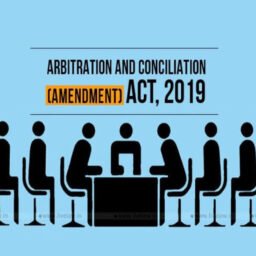INTRODUCTION
The term ‘Arbitration’ refers to a mechanism encouraging the parties to settle their disputes by way of mutual understanding or mediation by a third person. It offers an effective replacement to the long and frequently cumbersome process of judicial adjudication. Its growing popularity paved the way for the United Nations Commission to adopt the UNCITRAL Model Law of International Commercial Arbitration in 1985 which has subsequently harmonized the principles of arbitration and conciliation and strengthened its universal applicability. Furthermore, International Commercial Arbitration is a method to resolve disputes arising out of commercial transactions between private parties and acts as an alternative to litigation.
In most cases, the terms of the contract are previously mutually agreed by the parties and usually contain a dispute resolution clause along with details apropos to the forum, rules of procedure and governing law during the time of formation of contract. The International Court of Arbitration established in 1923 and functioning under the auspices of ICC is the cardinal arbitral institution whose ongoing focus is to ensure the proper application of the rules and regulations of ICC along with helping the parties, arbitrators to feasibly overcome procedural complexities. The article concisely puts forth the advantages of such an effectual mechanism and further analyses the status quo of international commercial arbitration in India and Singapore.
ESSENTIAL FEATURES OF INTERNATIONAL COMMERCIAL ARBITRATION
Arbitration in the field of international trade and commerce has become exceptionally strong and a major driving force for enhancing cross-border commerce and investment. Its essential features are precisely stated as follows:
- Neutrality- Arbitrators can be selected from different nations, the legal seat of the arbitration can be chosen in a neutral location, flexibility is offered wherein part of hearings can be held at locations away from the designated legal seat and the parties are given the freedom to choose from a pool of seasoned international arbitrators who are better tuned with the culture of international commerce.
- Selection of decision-makers and Expertise– There has been an immense growth in the number of skilled arbitrators who are best equipped to tackle matters involving a great degree of legal predicaments arising from the international sphere and additional factual complexities. Moreover, the enhanced control of the parties in the entire arbitral process including the selection of arbitrators through mechanisms of their choice steers to give an edge to international arbitrators over the system of courts.
- Enhanced confidentiality– In most nations, court proceedings especially insensitive, high-profile cases are conducted in public which often leads to the commencement of a parallel trial by media. However, in the case of an international arbitration proceeding, irrespective of whether the rules pave way for confidentiality in the process, parties are allowed to reach a consensus to maintain absolute privacy even in instances involving commercial confidentiality related to the dealings of their businesses.
- Coordinated dispute resolution and Finality of decision– International arbitration offers the main advantage over any national or state courts by establishing a coordinated forum to resolve all the matters between the international parties despite the geographical dispersal of the issue at hand giving rise to the disputes. It also renders finality in the process of decision-making without lackadaisical delays.
- Benefit in terms of cost, speed and proper enforcement– A flexible model is offered that can be tailored according to the expectations and requirements of the parties with regards to saving costs and ensuring a speedy redressal. Moreover, the ability to enforce arbitral awards through the New York convention leads to feasible and rapid enforcement.
INTERNATIONAL COMMERCIAL ARBITRAL REGIME IN INDIA: A PRIMER
In India, an international commercial arbitral regime is coined as an arbitration arising from a legal relationship of commercial nature where one of the parties is either a foreign national or a company or a foreign body corporate and so on. Primarily, there are three distinct systems governing arbitration and they are stipulated as follows:
- The legislation governing the ‘substantive law of contract’, also known as the ‘proper law of contract’.
- The legislation governing the conduct/procedure of arbitral proceedings, also known as the ‘curial law’ or ‘lex arbitri’.
- The legislation governing the recognition, enforceability of award and the arbitrability of dispute at hand.
The oldest and largest institution of arbitration in India is the Indian Council of Arbitration. While several Indian parties have been open to arbitration by notable international institutions like ICC, SIAC and so on, public sector undertakings continue to still prefer ad hoc clauses in their standard contracts.
STATUS QUO OF INTERNATIONAL COMMERCIAL ARBITRAL REGIME IN SINGAPORE
In Singapore, various spheres of arbitral proceedings are governed by different law systems and some of them are briefly stated below-
- The laws governing the conduct of arbitration, arbitration agreement, substantive law of contracts and recognition along with enforcement of the arbitral award.
- In the case of institutional arbitration, the arbitral rules of that institution are considered.
The two most popular and widely selected arbitral institutions include ICC and SIAC. Several advantages of arbitration over litigation in Singapore include the enforceability of awards in 166 jurisdictions, autonomy of parties, the confidentiality of hearings, binding nature of awards and flexibility of procedures.
A COMPARATIVE ANALYSIS BETWEEN THE TWO COUNTRIES
A comparative analysis between India and Singapore (especially in cases where the seat of arbitration is in Singapore) is cogently stated in the following points:
- Grant of interim relief: In India, section 9 of the Arbitration and Conciliation Act, 1996 renders the court the essential power to grant interim relief and even in a foreign seated arbitration, the party can seek appropriate relief from Indian courts under this section. In Singapore, the SIAC rules offer the discretion of parties to seek interim relief from the courts before the constitution of the arbitral tribunal (Section 12 of Singapore IAA).
- Appointment of arbitrator: Section 11 of the Act governs the appointment of arbitrators in India. Its source emanates from Article 11 of UNCITRAL Model Law. As far as the appointment of arbitrators for ‘Singapore Seated Arbitration’ is concerned, Part I of the Arbitration and Conciliation Act shall not be applicable. On the other hand, the appointment of arbitrators in Singapore is done by the parties and in the absence of such an agreement, sections 9 and 9A (Singapore IAA) lay down the basic rules for appointment in international arbitration.
- Application for challenging or enforcing the arbitral awards– In India, in case of an arbitration seated in any foreign territory, part II of the Arbitration and Conciliation Act which deals with enforcement of foreign arbitral awards in the country is applicable. Also, section 48 of the aforementioned statute provides certain grounds to challenge such a foreign award. These include the incapacity of the party, non-arbitrability of the matter, incorrect composition of the tribunal, absence of a well-drafted notice to the party in relation to the appointment and so on. If the arbitral award survives such challenges, it is deemed to be a decree of the court and can be executed under Order XXI of the Code of Civil Procedure. On the contrary, in Singapore, section 29 of Singapore IAA stipulates that a foreign award shall be enforced in a court by way of action or in a similar manner as an arbitral award made in the country under section 19. Moreover, in domestic international awards, the grounds to set it aside are mentioned under section 24 of Singapore IAA and article 34 of Model Law.
CONCLUSION
To cull out the gist, India has reflected a promising effort to promote domestic as well as international arbitration by laying down cogent provisions and revising it with effective amendments. Therefore, India is rapidly laying its foundations to become an arbitration and foreign investment-friendly nation. On the other hand, Singapore has been an active leader in the field of arbitration in Asia and has constantly rendered a cutting-edge response to the latest modifications in this arena of law thereby, making it one of the most premier seats of international arbitration. It still remains to be a commercially lucrative forum for arbitrative practices for it is also reckoned to be both neutral and geographically suitable for the parties involved in a dispute.
Author(s) Name: Jasleen Bedi (USLLS, GGSIPU, New Delhi)








